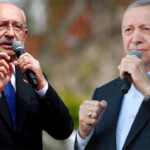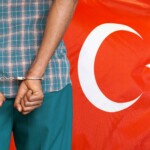For a journalist, this is the ultimate story. But for any citizen of Turkey, the current state of things is nothing but a prelude to tragedy.
The election results—which traumatized a prematurely-overjoyed opposition—unleashed an unprecedented merry-go-round dominated by the real victor: Turkey’s Far Right.
The optical illusions that kept uncritical opposition pundits hostage were based on the presumption that the crisis and disaster had triggered a roust —what they called in Turkish a “dip dalga.”
Instead, it has shown itself to be a xenophobic, isolationist wave—a vortex keeping Erdoğan on top while squeezing the secular, western-oriented core of the so-called “Table of Six.” The conservative, pious segment of the table have won more seats than they ever could have imagined, to the detriment of Kemal Kılıçdaroğlu and his party. There are already certain voices whispering that the tiny, insignificant parties such as the one led by Ahmet Davutoğlu have hoodwinked Kılıçdaroğlu thats to his generousity and goodwill—but it is still too early to say. We may leave that as the story develops.
And develop it does. Days before the second round, the real winner of the first round emerges. The far-right parties and its leading figures dominate the stage, imposing their will and squeeing Kılıçdaroğlu into a corner. The latter is desperate. He needs to close the gap of five percentage points—assuming, of course, that Erdoğan’s percentage of the vote stays where it is. Kılıçdaroğlu is therefore caught in a series of illusions as he turns his face to the far-right, courting figures like Sinan Oğan—allegedly backed by Baku—and he xenophobic and anti-Kurdish leader of the Victory Party, Ümit Özdağ. Over 24 hours, the entire chorus of the Nation Alliance’s largest party, the CHP, has joined the march of nationalism.
As perhaps expected, and predicted in these pages, these existential elections will not only will define the course of Turkey in its centennial, but will also demolish all that is left of party ideologies and identities. The most reminiscent comparison is Germany 1933, when the entire bulk of the opposition joined in a race to be more nationalist than National Socialists.
Back to the figures. Kılıçdaroğlu’s simplified game is based on a chase for some 3 million votes. The cheerleaders and defensive/denialist parts of the opposition camp seem to be pinning their hopes on the votes they hope come from “abroad votes” and first time voters. Kılıçdaroğlu is attempting to win Özdağ’s vote, which amounted to 2.2 % in the first leg, or around 1.5 million.
Aware of Kılıçdaroğlu’s despair, and following the shift of Oğan to Erdoğan’s block, Özdağ has raised the stakes, demanding that Kılıçdaroğlu issues guarantees—on paper—that Syrian refugees will be deported en masse, along with assurances that nothing will be done for Kurdish rights.
This is the siege of the Far-Right: While Oğan, who is staunchly loyal to Turkey’s hard-line state traditions, drags benefits from Erdoğan, Özdağ leaves Turkey’s main opposition party in a limbo between Kurdish voters and those who resent their will and even their right to enter Parliament.
It is also becoming clear that the HDP is in growing dismay from within, having performed below expectations, abandoned by its base with a relatively low turnout.
Another unanswered question is whether or not the second largest component of the “Table of Six” has lost its appetite for the second round. Although Meral Akşener, the leader of IYIP, has re-endorsed Kılıçdaroğlu and tried to be visible on the street, it is extremely doubtful that the IYIP electorate will be able to overcome its sense of defeat, especially since its ideological relatives—the far-right—have won a lot of ground in the AKP-controlled parliament. Even if they do go to the ballots, some of them may even vote for Erdoğan, favouring stability over a divided government.
In short: an unprecedented impasse for Kılıçdaroğlu, whose panicky nationalist gamble will most likely result in a loss on Sunday. It is not what the opposition had dreamed of.
I can already hear the objections, insisting that Kılıçdaroğlu still has a chance. Indeed, I have spent a great deal of time listening to the arguments of the optimists, those friends who in pride try to disguise their gloom. I asked them this: Given that Parliament is dominated by a massive Islamist-Nationalist ruling block, what would Kılıçdaroğlu’s chances be, even if he wins on Sunday? Especially if one considers the massive avalanche of rubble caused by the economic crisis, the results of which we will begin to witness from Monday May 29 on?
One line of thought emerged: That maybe even Erdoğan would prefer Kılıçdaroğlu to win on Sunday May 28, so that he would be crash and burn—forced to declare new elections as a culprit and lame duck.
The final week before the second leg exposes this kind of confusion along with an endless string of fantasies. I have never seen such turmoil and despair. For a journalist, this is the ultimate story. But for any citizen of Turkey, the current state of things is nothing but a prelude to tragedy.
The views and opinions expressed above are the author’s and do not reflect those of the Free Turkish Press.


